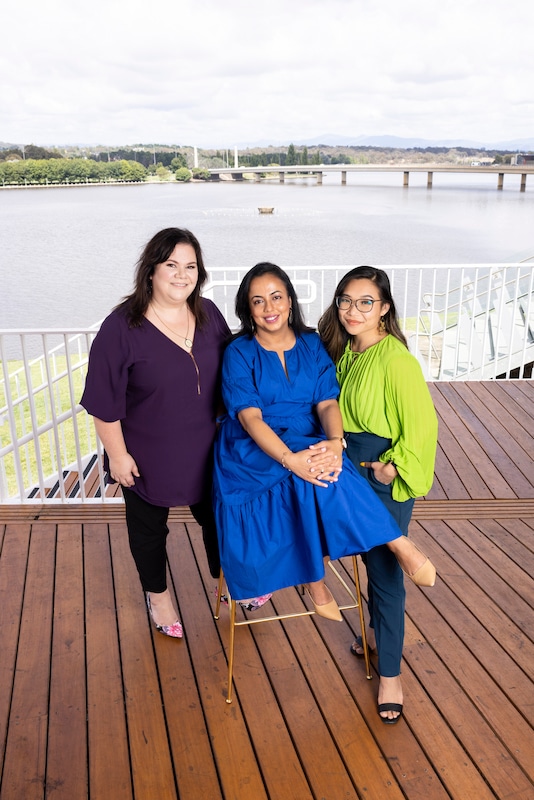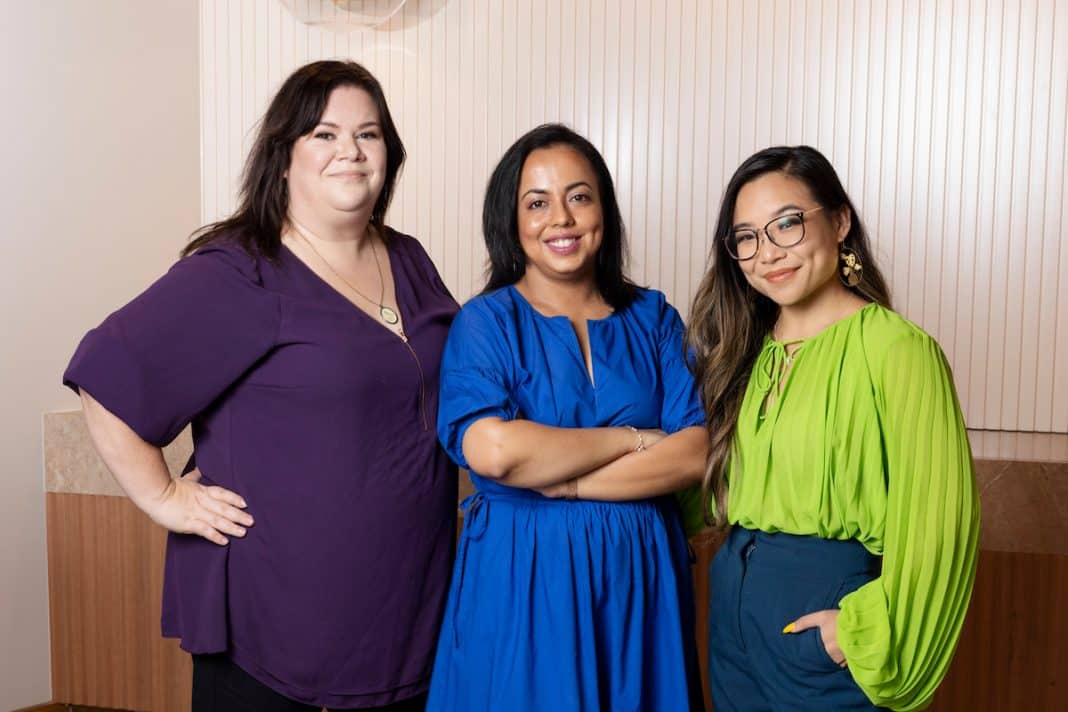Tech needs women.
It’s no secret that the industry responsible for shaping our future is split by a gender gap. A 2020 study led by Girls Who Code revealed only 21 per cent of women feel it is easy to thrive in tech. That statistic drops to just eight per cent for women of colour.
The challenges may not look the same as they did 30 years ago, but are we dealing with the same problems, wrapped in a purple banner?
In the lead up to International Women’s Day, 8 March, CW sat down with three generations of women in tech, over tea at The Marion at Regatta Point.
Many speculate the venue’s namesake, Marion Mahony Griffin (born 1871), was not given due credit for co-designing the city of Canberra alongside her husband, Walter Burley Griffin.
The Marion is where Canberra’s Women in Information and Communication (WIC) gather once a month over breakfast to swap stories and make plans to shatter the current 300-year timeline to gender equality.
Tara Searle (born 1976), Surabhi Mishra (born 1982), and Chloe Choy (born 1997) are the president, treasurer, and secretary of WIC. As well as representing Generations X, Y, and Z respectively, they each embody a different gateway to tech.
Chloe, who works in cyber security, was first introduced to her field when she fell for a phishing email.
“I had a very low awareness of cybersecurity, so when the opportunity came to move into the industry and learn more about it, I took it.
“One of my friends was in cyber and looking for someone with ‘soft skills’.
“After I took that job offer, I dedicated a lot of time to trying to build up my knowledge base in cyber. I was at the office until 9, 10, 11 at night … doing extra work just to keep up with the boys.”
Surabhi was born in India and would go on to attend the newly established all-women’s engineering college, the Indira Gandhi Institute of Technology.
“When I was growing up, the only options I was given was engineer or doctor. And I knew I didn’t want to be a doctor.
“It was a society that, even now, puts enormous pressure on the kids because of the population, and the competition… Still, I was the only female engineer in my family.”
Unlike Chloe, who grew up with tech, and Surabhi, for whom STEM was the only option, Tara saw the very beginnings of modern computers – and fell in love.
“When I was eight years old, I got the Atari 2600 – one of the wooden ones – and I loved it.
“In Year 11, I could finally do computing as an elective. There were very few girls in the class which, at first, was fantastic, hanging with all the boys who were excited that there was a girl there.
“Until I topped the class. The next year, no one would work with me.”
Despite attending high school halfway across the world, Surabhi exclaims, “That is exactly what happened to me!”
What is the greatest challenge you have faced in tech?
“My biggest obstacle was the way guys are given a push based on potential, while women have to prove themselves 100 per cent before they’re given a chance,” says Tara. “Then when I had kids, I was no longer ‘on the fast track’.
“I just watched as people who I considered peers, who went to the same high school and did the same courses at university, also had kids, but as men they didn’t have to slow down.
“To this day that holds women back. It’s changing – thank goodness it’s changing – but it’s still physically exhausting.”
“The workplace perception is that women parent and men babysit,” Chloe agrees.
“The greatest obstacle I have had to face is performative allyship. Companies, leaders, people who promote themselves as supporting equal rights, but their actions – and their reactions to other people’s behaviour – show what they really believe.”

Surabhi says, “For me, the biggest obstacle was migrating to Australia and starting from scratch.”
She describes “the unconscious bias” women of colour tackle in the workplace.
“You see other people getting promoted, maybe they’re the same gender, or the same colour, but not both.
“Meanwhile, you are getting passed on for promotions. People aren’t taking you for what you know, but how you look.
“When trying to fit in, I always worried about how I say things, how I dress, even my food … Chloe is right, you don’t need fake feminism. You need progressive people behind you, lifting you up.”
“Imposter syndrome is very real for someone my age,” says Chloe. “So, when [discrimination] is in the subtext, you gaslight yourself into wondering if it was real or not.
“Because of coded talk and implied meanings from senior leadership, I could never really be sure whether I was being taken seriously, or if I was being taken in as a pretty girl who could sit in at the meeting.”
Tara shakes her head. “As somebody who’s been in the industry for a long time, I can tell you that as you get older, the industry becomes more cutthroat, less inclusive.
“You realise that you weren’t gaslighting yourself. It’s really happening.”
“Something that really helps with this in the workplace is not mentoring for women, but coaching programs for men,” says Tara.
Surabhi agrees. “As someone who grew up in an age when there was a big push for all girls to study and to work, we aren’t teaching boys the same things we’re teaching girls – how to work and be the primary caregiver.”
“We have a specific responsibility in the tech industry because we know that tech is the future,” Tara adds.
“We know that digital is going to change the world. We need women at the table in order for this to be a safe space for the whole community.”
Canberra Daily would love to hear from you about a story idea in the Canberra and surrounding region. Click here to submit a news tip.



